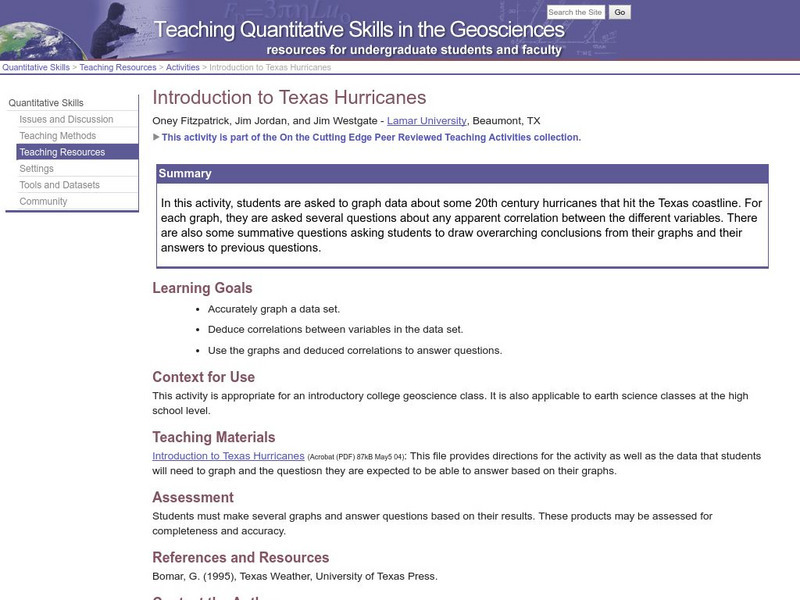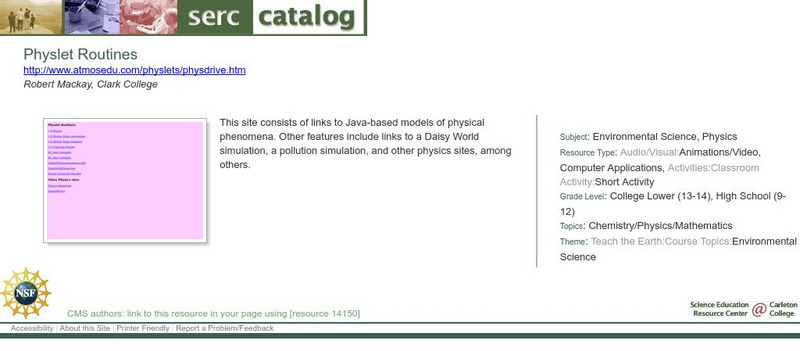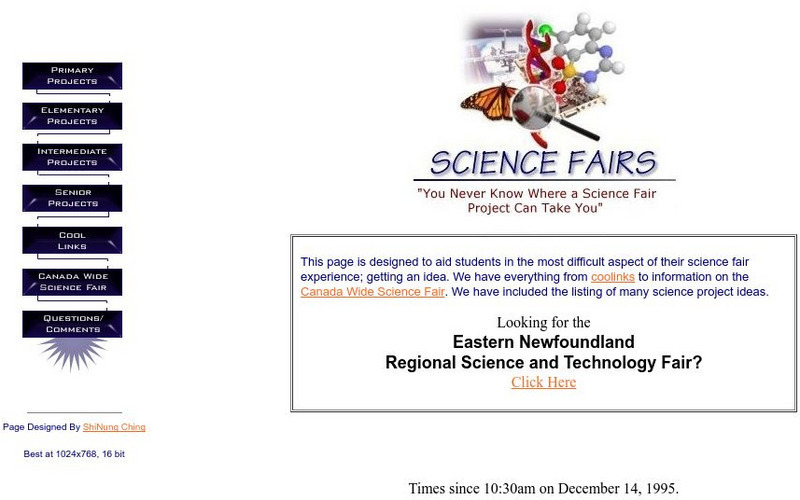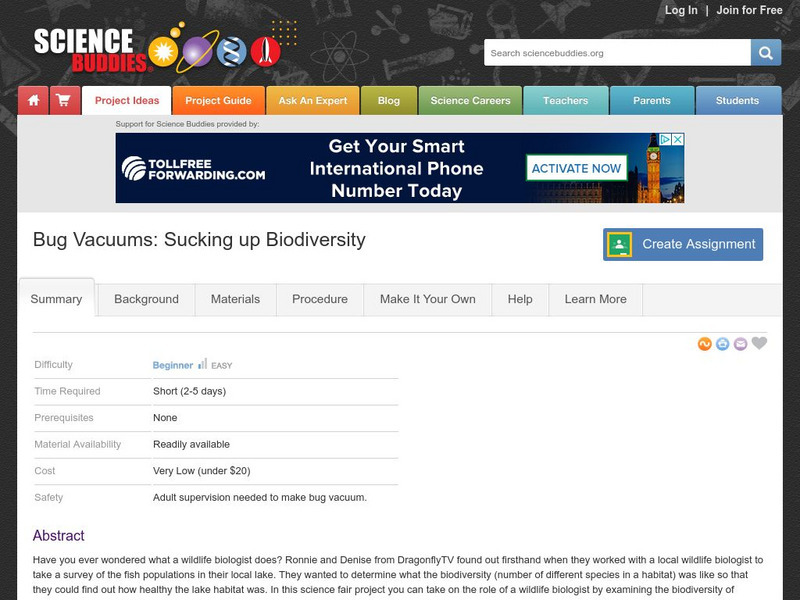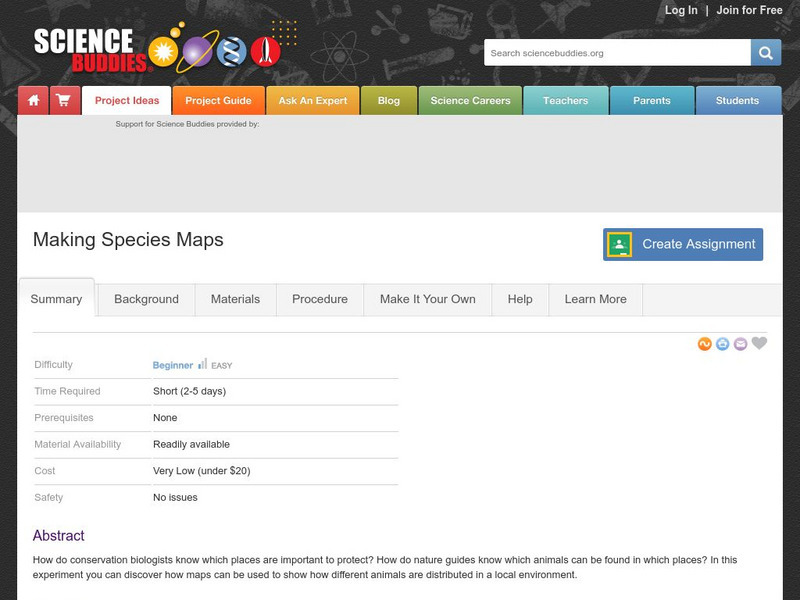Hi, what do you want to do?
Center for Innovation in Engineering and Science Education, Stevens Institute of Technology
Ciese Collaborative Projects: Bucket Buddies: Environmental Study
Bucket Buddies is an opportunity for students to participate in a world-wide environmental study. By identifying organisms in pond water, participating classes can compare their findings, and look for relationships in data. In addition...
Science Education Resource Center at Carleton College
Serc: Principles, Structure, & Implementation of International Environmental Law
This module introduces the fundamental norms and institutions that comprise international environmental law and then focuses on six specific topics: air pollution and protection of the atmosphere, hazardous waste, endangered species,...
Other
University of Delaware: Major Resource Kits
Major Resource Kits link academic majors to career alternatives by providing information on career paths, sample job titles, and a short bibliography of Career Resource Center materials available to students in a particular major....
University of Arizona
University of Arizona: Careers With Animals
Wide-ranging suggestions for student who love to work with animals and don't necessarily want to be a veterinarian. Site also has links to other animal career websites.
CK-12 Foundation
Ck 12: Earth Science: Branches of Earth Science Study Guide
Review the main study areas of Earth Science.
Texas Instruments
Texas Instruments: The Garbage Problem
Students examine data about garbage production and graphically represent data in a scatter plot. From the data students make predictions. They develop an understanding of the environmental impact of trash accumulation and the need for a...
Science Education Resource Center at Carleton College
Serc: Introduction to Texas Hurricanes
In this activity, students are asked to graph data about some 20th century hurricanes that hit the Texas coastline. For each graph, they are asked several questions about any apparent correlation between the different variables. Students...
Other
Science Fairs Homepage: Senior Projects
This resource from the Eastern Newfoundland Science Fairs Council provides really substantial projects for senior High School students. These are online topics, six areas, with about 10-20 topics per area.
Other
Sacnas: The Biography Project
This site profiles dozens of Chicano/Latino and Native American scientists. Most are still active in their field of research. Searchable by field of science. Also contains links to some fantastic science sites by topic.
CK-12 Foundation
Ck 12: Plix: Branches of Earth Science
[Free Registration/Login Required] An interactive concept map that shows how the different branches of earth science. After completing the concept map, students can test their knowledge with a "challenge me" quiz.
Science Education Resource Center at Carleton College
Serc: Physlet Routines
A collection of Java-based models of physical phenomena. Other features include links to a Daisy World simulation, a pollution simulation, and other physics sites.
TED Talks
Ted: Ted Ed: What Is the Tragedy of the Commons?
In 1968, Garrett Hardin sat down to write an essay about overpopulation. Within it, he discovered a pattern of human behavior that explains some of history's biggest problems. Nicholas Amendolare describes the tragedy of the commons.
Howard Hughes Medical Institute
Hhmi: Biointeractive: Understanding Global Change
Students will build models that explain how small changes in the Earth system's components and processes can produce measurable global effects.
Other
Earthworks: Jobs
Are you interested in an environmental career? Explore current environmental job opportunties in the Earthworks database.
Other
Cdli: Science Fairs Homepage
At this site from the Center for Distance Learning and Innovation there's a monstrous listing of possible science fair projects. You can choose from primary (grades 1-4), elementary (grades 4-6), intermediate (grades 7-9), or senior...
PBS
Nh Pbs: Nature Works: Ecosystems
How would you define an ecosystem? Check out this educational resource to learn more about the living and nonliving parts of different ecosystems.
abcteach
Abcteach: Ponds
[Free Registration/Login Required] The abcteach directory contains sample pages from their pond unit for non-members. Handouts are in PDF format.
Other
Open2.net: Ecosphere
Designed by the Open University and the BBC, this website from Open2.net explores ecosystems. Included is a lengthy discussion on closed ecosystems and their importance to research, as well as a virtual ecosystem, an interactive showcase...
Cosmo Learning
Cosmo Learning: Sustainable Living
A collection of video lectures from a unique course taught at the University of California, Los Angeles on sustainable living. The lectures range in topics from food systems to organic gardens. The lecturers also vary in their expertise...
John Wiley & Sons
Wiley: Environment: Chapter 21: The Atmosphere, Climate and Global Warming
A companion site to the textbook, Earth as a Living Planet. This chapter discusses global warming and how to deal with it.
Science Buddies
Science Buddies: Project Ideas: Green Detergents Less Toxic Than Conventional?
In this science fair project, test the toxicity of "green" and conventional detergents, using worms as test organisms. The Science Buddies project ideas are set up consistently beginning with an abstract, objective, and introduction,...
Science Buddies
Science Buddies: A Matter of Degrees: Tilt of Earth's Axis Affects the Seasons
In this science fair project, use a globe and a heat lamp to investigate how the angle of the Sun affects global warming. This project includes the objective, background questions, a list of all the materials you'll need, and the...
Science Buddies
Science Buddies: Bug Vacuums: Sucking Up Biodiversity
In this science fair project you can take on the role of a wildlife biologist by examining the biodiversity of insects in your own backyard. To do this, you will follow the directions to create a homemade bug vacuum.
Science Buddies
Science Buddies: Making Species Maps
Conservation biologists know which places are important to protect. How nature guides know which animals can be found in which places, are made possible partly by conservation biology. This experiment allows you to discover how maps can...
Other popular searches
- Environmental Science Games
- Environmental Science Unit
- Ap Environmental Science
- Environmental Science Energy
- Environmental Science Maps
- Environmental Science Debate
- Environmental Science Water
- What Is Environmental Science
- Environmental Science Projects
- Environmental Science Graphing
- Life and Environmental Science
- Environmental Science Rift










